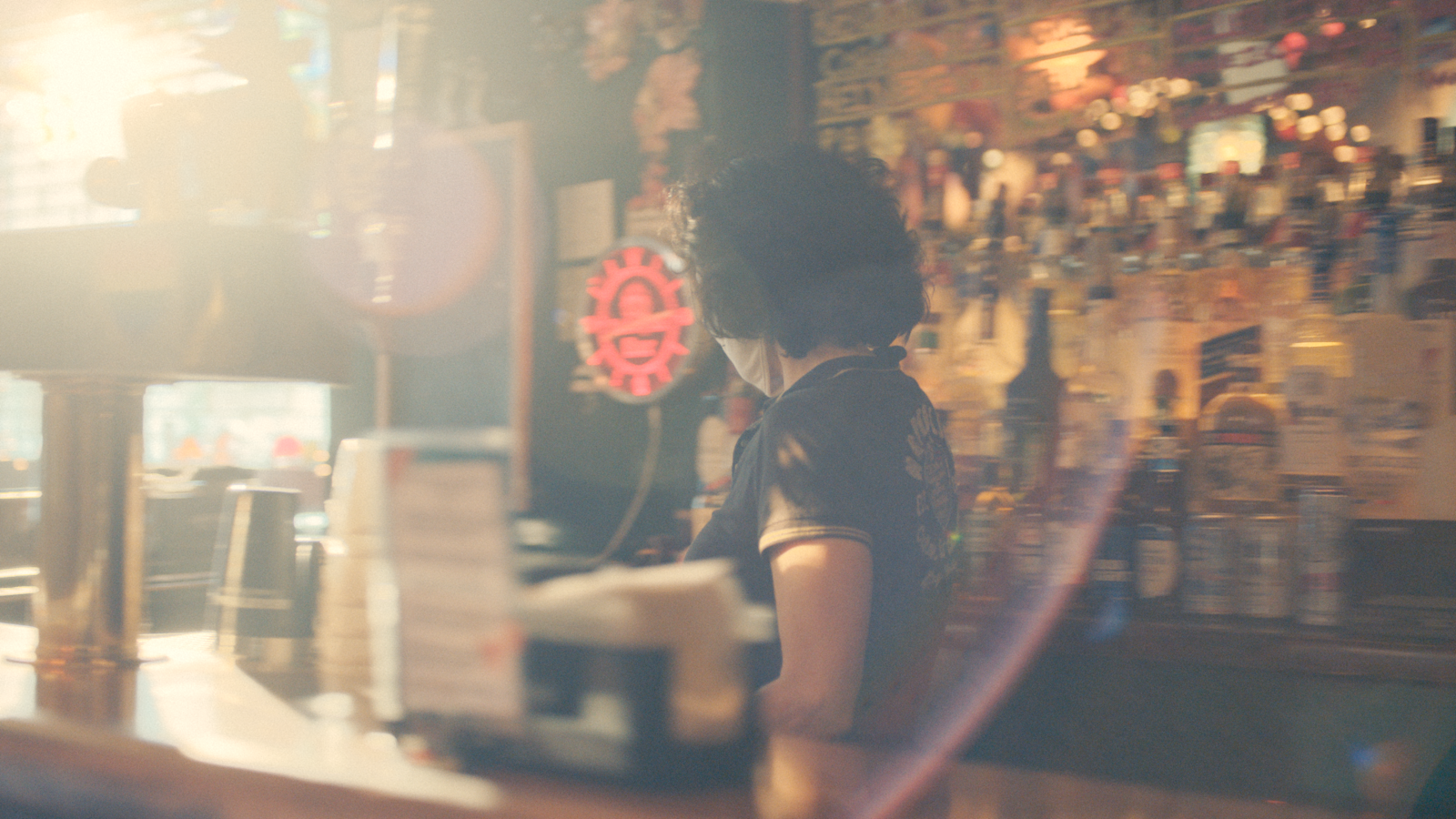Member Spotlight: Lesbian Bar Project
When the whole entertainment industry ground to a halt this spring, the team that would eventually become the Lesbian Bar Project was forced to take a pause from their lives as theater, television, and film creators. And when director Erica Rose learned how few lesbian bars still existed in the United States, she knew that she had to do something.
She reached out to director Elina Street and producers Lily Ali-Oshatz and Charles Hayes IV. Thus, the Lesbian Bar Project was born. With Lea DeLaria and the Katz Company as executive producers and in partnership with Jagermeister, the Lesbian Bar Project wants to raise awareness about lesbian bars and how imperiled they are, while also fundraising to support them through the pandemic.
Producer Charles Hayes IV spoke with Fractured Atlas about the importance of lesbian bars, his position in the work as a gay man, how he and the team have worked with a brand sponsor, and their plans to continue sharing the stories of these bars and their communities.
What are the beginnings of the Lesbian Bar Project?
[When] Erica realized that there were only 15 or so lesbian bars left in the country, it wasn't enough to just know that there was a lack of spaces or a lack of funding or access for these spaces. She mobilized herself and reached out to the three of us and said I want to save these bars; these are our spaces.
She has a funny anecdote that she always tells, but she says that Cubbyhole knew she was gay before she knew she was gay. It's been like a home for her. She went to NYU and her formative years have been in this city. And her discovering herself has been in these safe spaces like Ginger’s or Cubbyhole or Henrietta Hudson. And she wanted that same opportunity to still exist for everyone else, for the generations to come, but also for the people that are still here.
And so it began this long process. We got together as four back in April and we started thinking through it and brainstorming. How do we do this? What's going to be the best way to get the word out? And so that's how we landed on finding a brand sponsor and finding someone that has a name of their own that could push it out because we as individuals can only reach a certain amount of people.
Once we realized that there used to be 200 lesbian bars in the 1980’s and now there's 15 or so, and in the grand scheme of there being over 63,000 bars in the country, for there to only be 15 or so that feel like safe spaces for women, [trans] or non-binary folks, it's unacceptable. And we just wanted to do something about it.
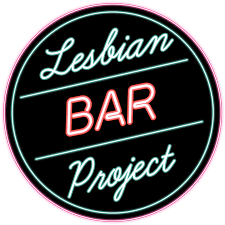
As much as this pandemic has hit us, we would not have stopped to see this [if not for the pandemic]. We would not have been in a space to receive this information and then think to do something about it. The pandemic slowed it down and it just kind of made us really think about what matters and how can we use our skill sets to impact and affect and change lives.
I'd love to hear you talk a little bit about lesbian bars. Why are lesbian bars so important and why are they dwindling?
In the research, we had two findings. Queer spaces or safe spaces for lesbians and women are disappearing at a staggering rate, but so are the queer spaces for people of color. The lesbian bars are disappearing at a 52% rate and the spaces for queer people of color are disappearing at a 61% rate.
And when they brought me in, I had this thought of, like, I'm not a lesbian or I don't necessarily frequent these spaces. I had had my own experiences inside of one or two that kind of just made me think like it's not for me, that's not my space. Which I was fine with, because I can respect when something is specialized for a group of people.
The truth of the matter is, white cis, gay male spaces are fine. I think part of it is because men tend to have access to money, especially white males tend to have access to money.
There is a gender bias for business owners. Most of these lesbian spaces are owned by women. And so if they don't have access to funding or if someone isn't willing to give them that opportunity, then they're not necessarily going to get the same treatment or equal opportunity to stay afloat and to be alive.
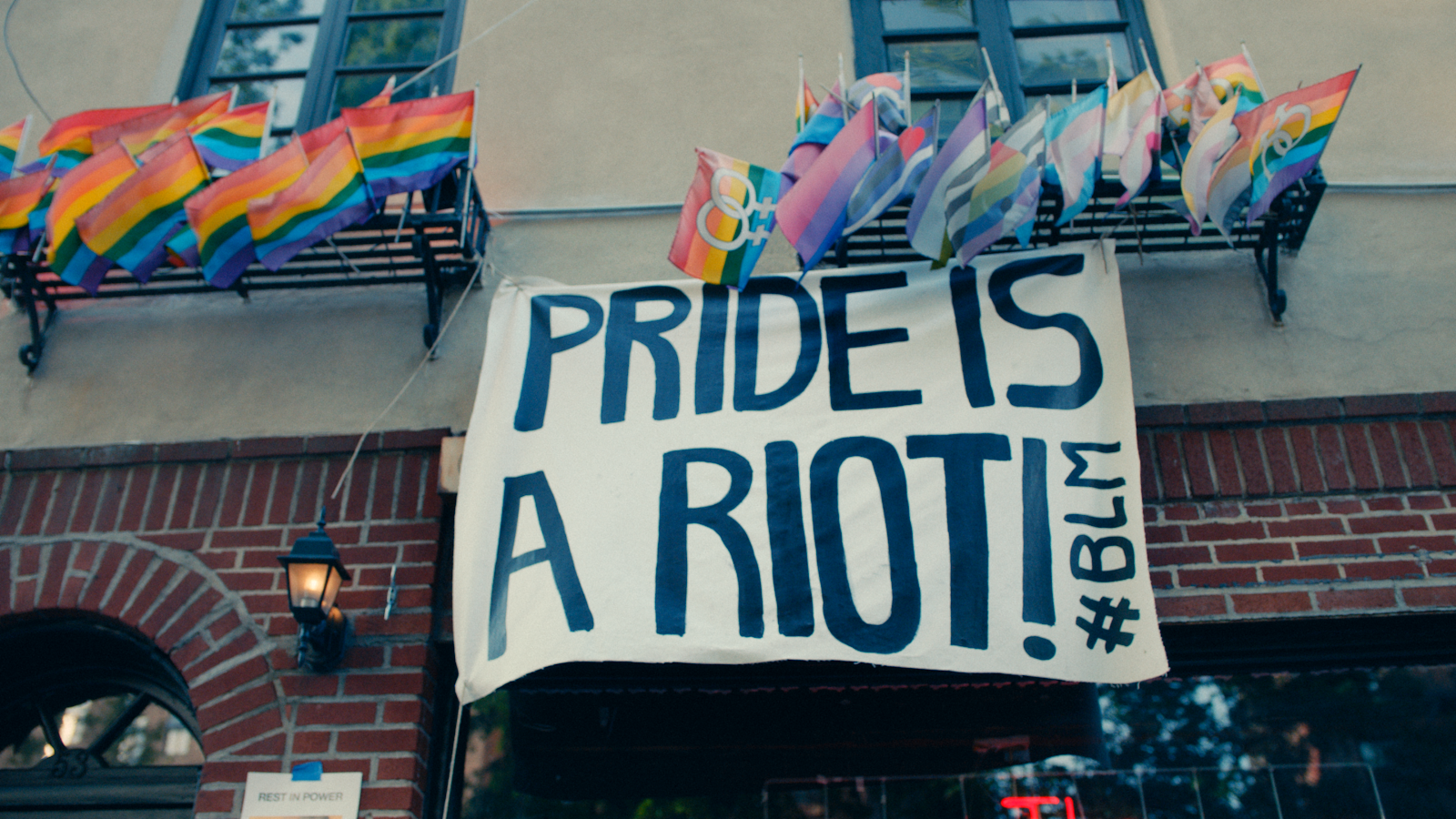 Photo courtesy of Lesbian Bar Project
Photo courtesy of Lesbian Bar ProjectWe've gotten pushback in certain areas based on our definition of lesbian and how we are including trans people. There's been some transphobia because those particular people want their lesbian bars to be for lesbians. And we don't identify with that. We don't want to be segregating different groups of people inside of the same community.
We're also learning that these bar owners are defining themselves as a bar for everyone because they may be one of two or the only space in that city or in that state. And they don't want to turn people away. It's opened up this whole can of worms of do you define yourself as a lesbian bar or do you define yourself as a gay bar?
And in terms of the disappearance, the needs of the queer community have changed. Younger generations don't necessarily have a home bar. They're going to circuit parties or they're going to pop up parties. And shout out to the queer community for adapting to what is available to them because that’s what promoters are now doing! They may not have a space dedicated to queer people, but they may have a night that's for gays and lesbians or they take over a space for a day and it happens like once a month.
People are looking out for that one-time opportunity to go party versus just like gathering in the community to see people that look like them or to interact or engage with older or younger generations and have those kinds of open dialogues and conversations.
And even in some of our community interviews some of the older generations were saying that it's changed because parking regulations have changed. People used to drive in from Jersey and park and have the night and then they could drive back home. But when the city changed how you could park overnight and like all of this stuff, it just discouraged people from doing the same things that they had been doing. So it varies. I think there's a lot of factors at play.
But overall, we want to just bring awareness to these spaces. So even if they're not making hundreds of thousands of dollars every month, at least people know them and recognize them. And maybe as you're going to a new state, the Lesbian Bar Project website can be that check in. We want it to be this connected hub for everyone that needs to be aware of these spaces so that they can thrive beyond this Corona moment.
It's really interesting that you recognize that these spaces are not necessarily for you, but here you are still investing all of this work.
I was shocked to find out the percentages at which we're losing these spaces.
And for me, as a queer person of color or gay man of color, I want to help everyone. I also was like, can we add on to the campaign? But no, you need to get people to focus on one thing so that they understand that this is an issue and then use that steam to do something later.
I also had conversations with some of my gay friends and they're like, you're helping the lesbians? And I'm like, yes, I am, because we all need support and we all need help. And we all need to be conscious of how we're losing our safe spaces.
People may question my role in this or why I want to be a part of this, but overall it was just like we're the LGBTQIA+ community. So if we're not looking out for each other within the community, then how can we expect anyone outside of it to care about us? We're not going to grow and thrive and be successful beyond this moment if we can't get over these differences. That's important that your identity matters and your opinion matters, but we should still understand that we all need support and we all need to feel safe.
We did community interviews to learn more about people's experiences and the friends of mine that are lesbians, they're like, no, I don't really go out anymore because I don't feel safe and don't have as much fun. They'll go to a hookah bar instead or they'll go hang out at a friend's house instead. Everyone should be allowed to be in a space and feel safe and feel comfortable to have fun and to let their hair down with the people that they care about.
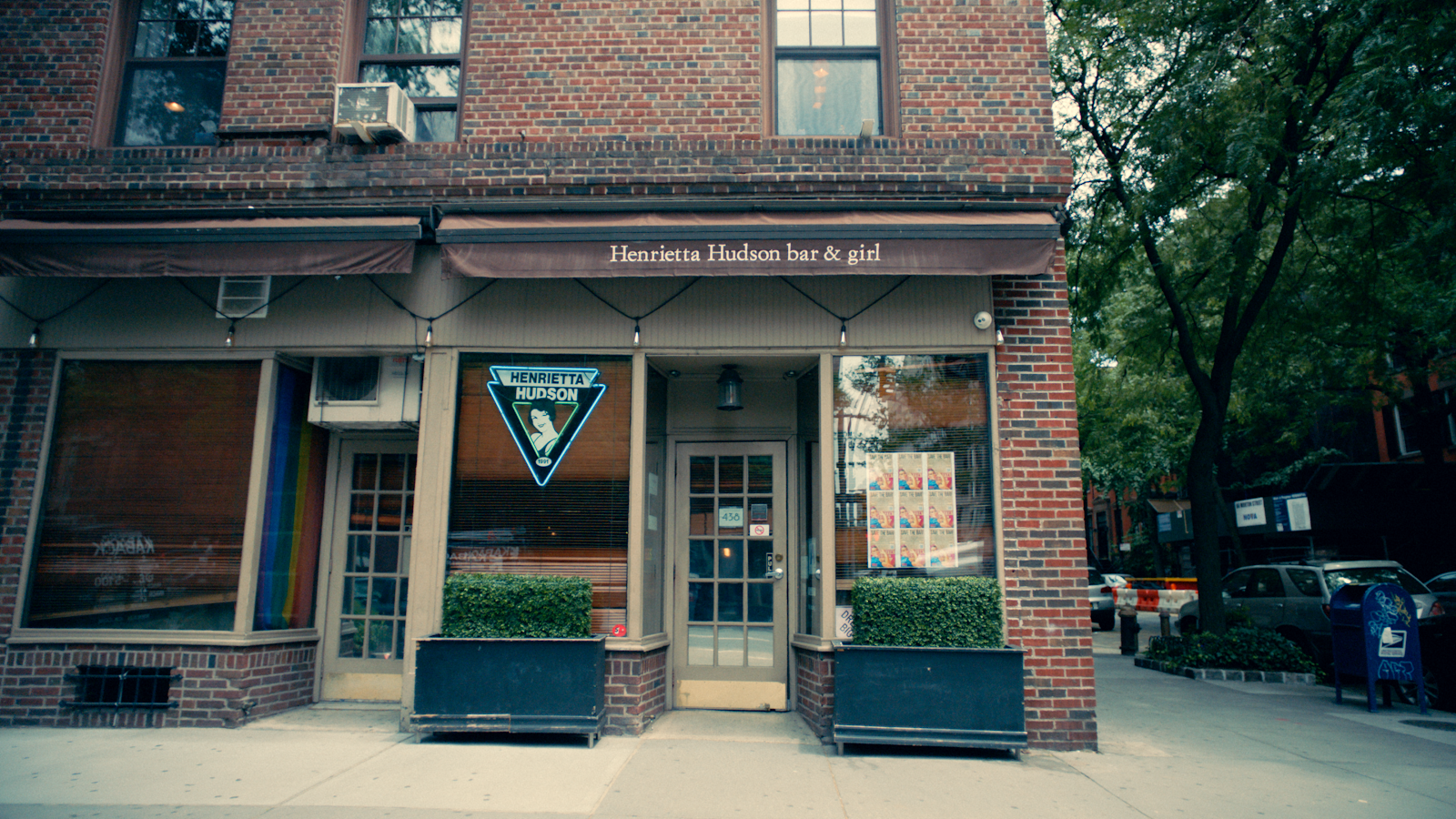
How have you all worked together as a team?
I've worked on a lot of teams, but I have to say this has been one of the most successful and full of love groups that I've stepped into. Lily [Ali-Oshatz] is our sunshine, our light of joy. She keeps us on path and on task and aware of everyone else and how they may or may not receive what we're doing. Elina and Erica are our directors: creative, get it done, let's have these meetings, let's talk.
We all keep each other on task. I think that we've had little moments of [conflict] but it's natural when you're dealing with opinionated people that care. And so it's been a mix of experiencing those feelings, being comfortable enough to express, honestly, if we feel a certain kind of way about the work ethic in this moment or the work culture in this moment, or needing to have a moment away from the project to go do other stuff, because it's been this long lead-up.
But when we launched, this project has become a full-time job where we're working with the PR team from Jager. Erica and Elina have done interviews, we've done podcasts. We're going to be on a radio show. We're so grateful because once we got out there, it was like everyone coming out of the woodwork to be like, oh, I want to collaborate, I want to be a part of this. Can we partner, can we get involved? I'm just grateful that the community is showing up and really just kind of supporting these spaces. But our team has been impeccable.
Tell me about how you've been partnering with Jagermeister.
Jager has been a godsend. In our research and development, we were like, let's go to a liquor brand [because] we're saving bars. It makes sense. And so we pitched to a lot of people and everyone was so for it. But some companies were in a better space financially than others. While they wanted to support, the pandemic didn't allow them to be that sponsor. And so a little down the line, we had gotten connected to someone from Jager. Olivia O'Leary, who is our Jager rep reached out and [said] we love this and we want to be involved.
Jager had already had a Save the Night initiative that they had launched so it fit pretty perfectly to what they had already started. It's been such a wonderful partnership and collaboration. They connected us to their PR team and they ran with it.
We didn't know what to expect with the brand. We didn't know if they were going to want to come in and have creative control. We didn't know they were going to come in and just kind of take over the project. But Jager said we believe in what you're doing. We love what you've created and we want to support. We'll just make sure that we're tagged and our stuff is represented well.
I'm just happy that we found a partner that cares beyond just having their name on something, but even to the point where they don't need their name on everything.
Have there been any bumps along the road? What have been some of the challenges you faced?
Keeping the morale up of our own team, especially in the months where you're reaching out to a lot of different people or a lot of different entities with such a great cause. People want to be involved and you take the call and you express your heart and soul and they're like, we love this, but we can't.
It's easy to get discouraged when someone tells you no, especially in the midst of a pandemic when you don't feel like you can’t do anything else except email someone or do a cold call reach-out.
We scoured LinkedIn and looked for different people that may make this decision in this brand. We were realizing that we were getting connected to people but they were like, well, I love this, but I need to talk to so-and-so because this isn't my decision to make. And so we learned what those [decision-making] positions were. In the beginning, it was just staying focused and continuing to push because we self-funded a good majority of this before Jager became involved.
Other than that, it was just also the adjustment of us realizing we're stepping into campaign mode, so we need to check in every day. We need to be reading emails every day. We need to be talking to our partners every day.
It's a continuous thing, raising money. And we've done it a couple of times in our own right for short films and projects like that. But it's a lot. But also seeing what it takes to activate a group of people...it takes a lot.
Where does Fractured Atlas fit in?
The Lesbian Bar Project is under an LLC and Jager was happy to be involved, but their donation needed to be tax-deductible. So we went to fracture Fractured Atlas because we were aware of their services in general.
We went to them and just started asking questions. Fractured Atlas agreed to be our fiscal sponsor for the creation of the piece. So Jager's portion to create [the work] is what [Fractured Atlas] took in for us and then distributed it to us.
In normal, donation-based things you can say like donate and it's tax-deductible for your portion that you give. But the donations towards the bars are not tax-deductible because it's coming through us. And then we're dispersing it evenly of our own accord because we're an LLC. And so [Jager] couldn't give us that sponsorship for donations, but they can give us a sponsorship for the creation of the piece.
[Fractured Atlas supports] us creating the piece, the PSA and putting it out there and paying everyone that was involved to create it. And then the donations for the bars are running directly through the Lesbian Bar Project website. Those will then be added up and split evenly among the 15 or 16 bars that exist.
The campaign ends soon, right?
Yep, the day before Thanksgiving. We chose a restricted timeline because when people know that they can give open-ended, they wait and they wait until the end or they just kind of let it sit. But when people know, like, oh, I can only give until this day, it kind of mobilizes and puts a fire under their butt a little bit quicker. And I think that we've had a good turnout based on that.
In the first two weeks, we raised over $30,000. And so, with another two weeks left and with these live events coming up, and with the merch, I think we're going to do pretty good. To really impact everyone, we would need like a million dollars, which is a lot in 30 days. So we realize this is not going to keep the bar open, but we think it'll be helpful to maybe pay the bartenders or to pay the rent for a couple of months or whatever the case may be.
So after the campaign ends, do you have any idea about what's next?
This has always been a three-phase process. Phase one and phase two were the PSA and the website; the PSA to raise awareness, the website to raise donations. And then phase three is more like a docu-series exploration, where we'll go to these places and talk. We want to give people a history and understanding of what these spaces are, why they're still here, why some of them are gone and just really build the community around it.
We thought about maybe at some point we [would] start a foundation and become a 501(c)(3) so that we can continue to support these spaces; the lesbian bar spaces, but also spaces that are underserved and underrepresented. We've talked about maybe there's a coffee table book that we can make. We've sourced all these archival images and we've talked to so many people. We've had community interviews with 80-year-olds, with 20-year-olds.
But the first next step is to really dive into the creative and develop the docu-series so that we can pitch in and begin the process of getting it either on a streamer or someone's network.
Anything else you’d like to add?
Ultimately, it's just like, you know, please donate. Please get involved. If it's $5 or $500, it all helps. And we're going to have some amazing events coming Sunday, November 22nd and Monday, November 23rd.
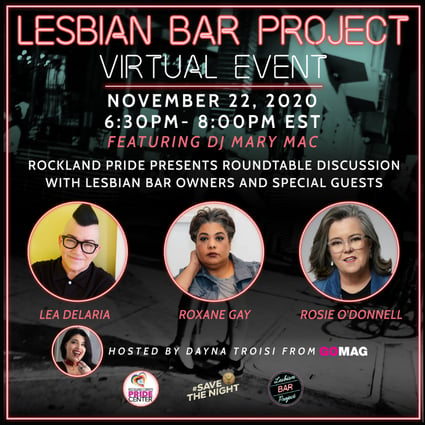
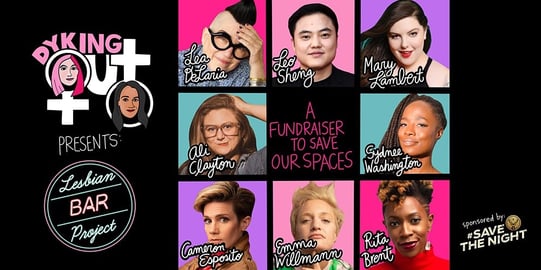
Sunday [will be ticketed]. It's more an academic intellectual discussion along with some music and fun. We'll have a DJ, a host, a specialty Jagermeister cocktail demonstration. We'll have a roundtable discussion with some of the bar owners from the bars around the country. And we're going to have a roundtable discussion with what we're coining “celesbians” with Lea DeLaria, Rosie O'Donnell and Roxane Gay.
Monday is a free comedy show that we are doing with the Dyking Out podcast, and that is a little more chill because it's free and people can kind of come and be a part of it and laugh. We've gotten a few great names confirmed like Cameron Esposito, Ali Clayton, Emma Willmann, Leo Sheng, Rita Brent. And then a musical performance from Mary Lambert. So we're just hoping that this continues to push it and just kind of gives us a bump in terms of what we're able to raise. Just to give people something to rally behind so you can just be on the lookout for those.
And t-shirts and totes!
You can support the Lesbian Bar Project’s operational costs by donating to their Fractured Atlas fundraising page or support the bars directly.
About Nina Berman
Nina Berman is an arts industry worker and ceramicist based in New York City, currently working as Associate Director, Communications and Content at Fractured Atlas. She holds an MA in English from Loyola University Chicago. At Fractured Atlas, she shares tips and strategies for navigating the art world, interviews artists, and writes about creating a more equitable arts ecosystem. Before joining Fractured Atlas, she covered the book publishing industry for an audience of publishers at NetGalley. When she's not writing, she's making ceramics at Centerpoint Ceramics in Brooklyn.
